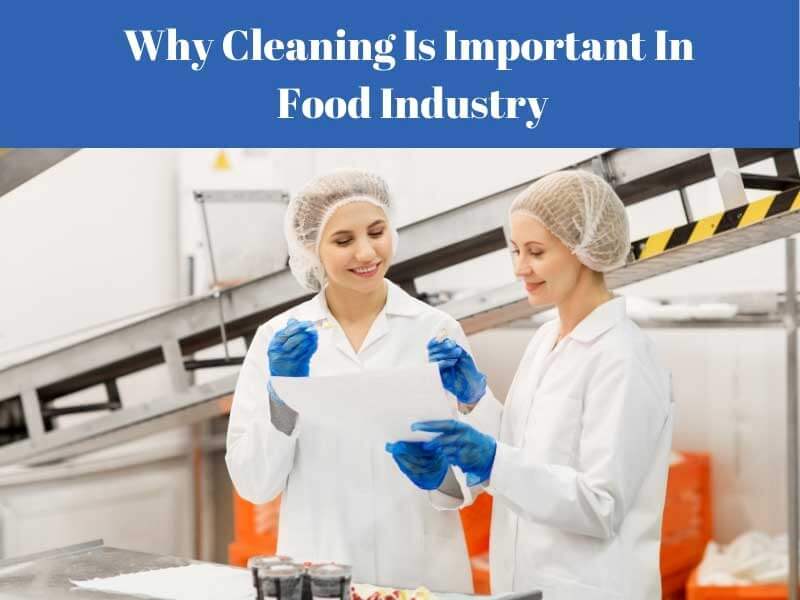Why Cleaning Is Important In Food Industry
Why cleaning is important in food industry? Read this article to find out.

The Importance of Cleaning In the Food Industry
Many New Jersey companies learned the hard way that cleaning is important within the food industry. From sanitizing surfaces frequently to properly cleaning dishes and utensils to even keeping windows and panes clean with frequent window washing to prevent dust and debris contamination cleaning is vital for restaurants and eateries.
One of the most heavily regulated industries is with companies handling foods and for a good reason. Cross-contamination is one of the leading causes of these regulations. Clean equipment is essential for the preparation, serving, and manufacturing of food. In this article, we will discuss the importance of cleaning in the food industry.
History of Cleanliness Regulations
Until the year 1906, regulations requiring food industries to prevent cross-contamination of foods were not applied for the nation. Humans have known for thousands of years that food can cause poisoning if ingested. In this regard, over time, humans developed ways to process food to reduce the risk of sickness. These are:
- Pickling of food
- Salting food
- Canning food
- Smoking food
- Fermenting food
- Cooking food
Keep in mind most of these were developed by trial and error, as no one knew that bacteria or viruses were the issues. Humans only knew these methods worked to reduce sickness from foods. It wasn’t until later, when microscopic bacteria and viruses were discovered, that cleaning could prevent sickness when working with foods.
Foods That Cause Cross-Contamination
Most of us think of undercooked pork or seafood when dealing with foods that can have bacteria issues, but let’s take a look at the reality of what can cause sickness when dealing with foods.
- Greens: Lettuce and other greens are notorious for carrying E. Coli in recent years. If not washed properly before resting on a food work station, this can cause severe illness.
- Cheeses and Deli Meats: Bacteria builds on cheeses and deli meats and can be transferred to whatever area they are sitting.
- Raw Eggs: Egg material left on food work station can cross-contaminate to other foods and cause sickness
- Poultry, Meat, and Seafood: All of these meats in raw or undercooked forms can be full of harmful bacteria.
How To Keep Food Working Surfaces Clean
Have a Cleaning Plan
Creating a cleaning plan and schedule is the first step in keeping working surfaces and the entire premises clean and disinfected. Hiring someone for restaurant cleaning is also vital to your success.
A cleaning plan is important because it does not leave it up to the employees on what and when to clean. By doing so, this makes sure every possible risk is addressed in your cleaning plan. Here are some examples of what a cleaning plan needs to involve:
- What to Clean: A cleaning plan needs to include a specific list of every object that needs to be cleaned. The list is to be extensive and relate to any surface that could cause cross-contamination.
- When to Clean: It is not enough to think an area looks clean. Bacteria and viruses are unseen and can grow to a huge colony while no one will ever know. Creating a schedule of when to clean makes sure these areas are sanitized properly.
- What Tools to Use: Cleaning in the food industry means that the designated areas need to be spotless and sanitized, not just wiped down. Using the proper cleaning tools for the job and not what is at hand will maintain a clean surface. A plan will make sure employees know what tools to use for all sanitizing.
- Cleaners to Use: Not all cleaners are alike, even if you need the same result. For instance, a cleaning plan must have a cleaning solution for each piece of equipment cleaned. This provides the best results and can be dangerous in a food environment if the wrong cleaner is used at the wrong time and place.
- PPE: Personal protective equipment needed for employee protection should be listed in the cleaning plan and enforced.
- What to do with Waste: Proper waste disposal needs to be mentioned in the cleaning plan. It is not good to scrub a food prep station and then toss the dirty rag onto another clean countertop. Rules on how to handle dirty rags, sponges, and even dirty water from mopping should be spelled out in the cleaning plan.
Pro Tip: You might want to consider hiring a cleaning service in New Jersey to help you at home.
Clean Surfaces
Restaurants, food processing facilities, and other food handling processes, all have two things in common. They deal with many of the foods listed above and have limited space to work. Using the same surfaces to process different foods is the major cause of bacteria and viruses’ cross-contamination. To prevent cross-contamination, these surfaces must be cleaned and disinfected often. More specifically, they need to be cleaned between different food groups sitting on the surfaces.
Make sure no food is brought into an area that has not been properly cleaned, or that is in the process of being cleaned.
In the Garden State, a lot of professionals offer a commercial cleaning service that can help you with your business.
Clean Any Items That Are Touched
As mentioned in the plan above, any items that are touched can by hand spread bacteria and viruses. Here is a list of items that should be cleaned.
- Door handles
- Mop Handles, buckets
- Break Rooms
- Shared Tables and Chairs
- Light Switches and Outlets
- Refrigerators
- Carts that move food
- Walls
- Floors
- Vent Hoods
Professional Cleaning
For cleaning and sanitizing outside of your plan’s daily activities, have a professional service set up on a schedule for deep cleaning and sanitizing. A professional company will have the right tools and know how to clean hard to reach places and to sanitize the entire working area properly.
Cleaning World Inc. offers a wide range of top-rated cleaning services. Our New Jersey based cleaning company is well known in the industry. We provide Heavy Duty House Cleaning and Office Cleaning.
Conclusion
Food can become contaminated with bacteria and viruses and cause severe illness to those working around or being served. Safeguards must be taken to ensure everyone is safe from foodborne illness by cleaning properly between food handling. Companies should have a plan in place that makes sure every aspect of the sanitation of their business is completed in the right way. Hire a Janitorial Service professional to help you maintain the cleanliness of your property.
By putting this plan in place and making sure it is followed, you can greatly reduce the risk of illness to everyone. Having a professional service assist in regular sanitation can also add to your risk reduction. Make sure your employees follow these rules as cleaning is important in the food industry. Take note that junk removal is important to lessen the contamination.
You should now know why cleaning is important in food industry consist of and wish you all the best.
Expert Recommendation: Explore specialized services like junk removal offered by Cleaning World Inc.
Take a look at their location below:





